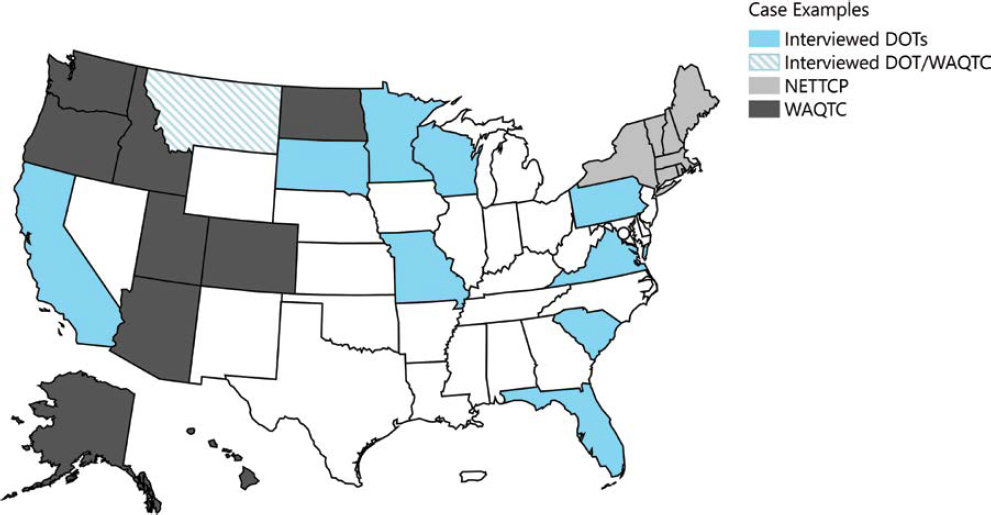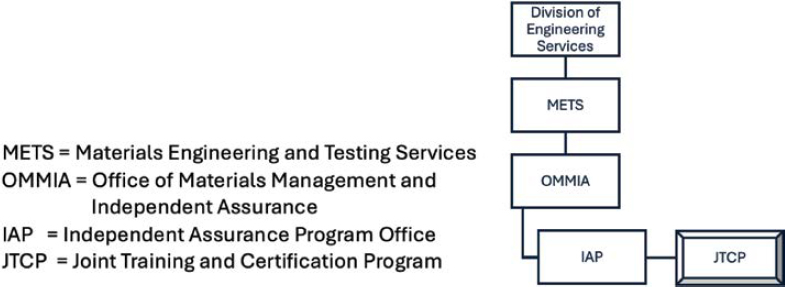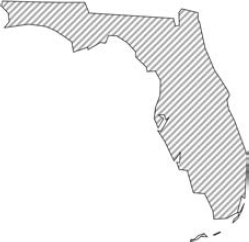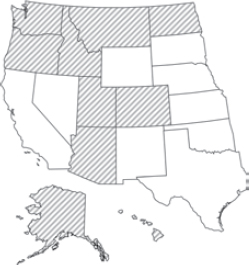State DOT Certification Programs for Materials Sampling and Testing Personnel (2025)
Chapter: 4 Case Examples
CHAPTER 4
Case Examples
For the case examples included in this chapter, representatives from 10 DOTs and two cooperatives programs were interviewed. The DOT interviews focused on two different components of DOT certification programs: program management (six DOTs) and the use of technology in training and examinations (four DOTs). The cooperative interviews covered both components. The DOTs were chosen to represent all four AASHTO regions as well as northern and southern climates. The following representatives were interviewed:
- Program management focus DOTs:
- California, Florida, Minnesota, Missouri, South Carolina, and South Dakota
- Technology use focus DOTs:
- Montana, Pennsylvania, Virginia, and Wisconsin
- Cooperatives:
- Northeast Transportation Training and Certification Program (NETTCP) and Western Alliance for Quality Transportation Construction (WAQTC)
In Figure 24, the interviewed DOTs and cooperative members are shown. The DOTs interviewed are shown in solid blue, NETTCP members in the Northeast are shown in medium gray, and WAQTC members in the west are shown in dark gray. In one instance, both a DOT and a member of the cooperative are shown as being interviewed.
The first six DOTs listed illustrate the options DOTs employ to manage sampling and testing certification programs.
The programs described were selected to include a variety of management and training programs. They include those managed by the DOT, by DOT and academia, and by DOT and an outside entity (consultant or organization). They vary in who performs the training: DOT, college, or private company. The DOT programs were also chosen to represent a range of different types of certifications offered (from five to 31); annual volume of certificates issued (from 750 to over 16,000); and to cover the range of responses to the survey question on ability to meet the demand of testing personnel requiring certification in the previous 2 years (survey Question 17).
Each program management case example includes a discussion on the following:
- Daily management of the certification program
- Management of the training program
- Steps for training and certifications
- The history of each program
Table 9 identifies the interviewed DOTs, their AASHTO region, and the results from the following initial survey questions:
Question 6: Who is involved in the daily management of the qualification/certification program for the different material areas? (select all that apply)

Question 16: How many materials testing qualification/certifications are issued by this DOT in a year? (approximately)
Question 17: Has the DOT program been able to meet the demands of testing personnel requiring qualification/certification in the last 2 years?
The remaining four case examples focused on the technology used to train and certify sampling and testing technicians. The DOT programs selected represent each of the AASHTO regions. Each selected DOT indicated in response to Question 12 and Question 15c that it used online training for at least one of the materials areas and that it used online testing platforms to administer written exams. These DOTs were interviewed to provide a range of examples of the technology used for training and examinations. The examples include information from the survey and website review related to the certification program.
Table 9. Case examples described related to program management.
| DOT | AASHTO Region | Question 6: Program Management | Question 16: No. of Certs/Year | Question 17: Meet Demand? | No. of Different Certs* |
|---|---|---|---|---|---|
| CA | 4 | DOT | 16,600 | Yes | 5 |
| FL | 2 | DOT & outside contractor/consultant | 8,500 | Yes | 31 |
| MN | 3 | DOT & college/university (also outside contractor/consultant and outside association for concrete) | 3,500 | Yes | 11 |
| MO | 3 | DOT & college/university | 1,335 | Yes, but… | 13 |
| SC | 2 | DOT & college/university | 1,800 | No, not w/o changes | 13 |
| SD | 4 | DOT | 750 | Yes, but… | 16 |
* The different certifications are identified in Appendix F.
Table 10. Case examples described related to technology used for training and examinations.
| DOT | AASHTO Region | Question 6: Program Management | Question 11: Training Management | Question 12: Training Components* | Question 15c: Technology Used** | Question 16: No. of Certs/year |
|---|---|---|---|---|---|---|
| MT | 4 | DOT | Outside association | Online | LMS In-house using electronic devices/computers | 225 to 300 |
| PA | 1 | DOT & college/university | DOT & college/university | Online (concrete) | Testing centers (i.e., college/university or private entity that proctors the exam) | 1,745 |
| VA | 2 | DOT & outside contractor/consultant & college/university (also outside association for concrete) | DOT & college/university (also outside association for concrete) | Online (soils, aggregate, and concrete) | Testing centers (i.e., college/university or private entity that proctors the exam) In-house using electronic devices/computers | 2,077 |
| WI | 3 | DOT | College/university | Online TC3 or NHI seasonal/just in time | Testing centers In-house using electronic devices/computers | 1,800 |
* All four DOTs also identified conducting training in person and that an exam is included
** All four DOTs also identified having an online testing platform and an in-house option using pen and paper
Table 10 identifies these DOTs, their AASHTO region, and the results from the following initial survey questions:
- Question 6: Who is involved in the daily management of the qualification/certification program for the different material areas?
- Question 11: Does the DOT have a training program associated with the qualification/certification program in these materials areas, and how is it managed?
- Question 12: For the areas that the DOT has a training program, does it include these components?
- Question 15c: What types of technology does the DOT use to administer written exams?
The 10 DOT interviews are presented first, followed by the two cooperatives (NETTCP and WAQTC).
Program Management: California
Highlights
- Joint DOT and industry program, with academia involvement
- Managed by DOT IA office
- In-person classes with DOT and industry

Daily Management of the California DOT Program
The California DOT(Caltrans) maintains a Joint Training and Certification Program (JTCP), which is composed of an advisory council made up of four Caltrans employees, two California State University (CSU) delegates, and representatives from FHWA, the California Asphalt Pavement Association, the California Construction and Industrial Materials Association, the ACI,
Associated General Contractors of America, the Southwest Concrete Pavement Association, the California Council of Testing and Inspection Agencies, and the American Council of Engineering Companies. The advisory council has a written charter; the details related to training and certifications are located on the program website (JTCP, n.d.). The advisory council meets twice a year. The joint program manager and council chair is an employee of the Caltrans Independent Assurance Program (IAP). The joint program certifications are also described as IA certifications. The IA program is an office under the Materials Engineering and Testing Services (METS). The IA program also manages the Statewide Independent Assurance Database, Inertial Profiler Certification Program, and laboratory accreditation for Caltrans. The Statewide Independent Assurance Database is a listing of qualified testing laboratories, certified laboratory technicians, and joint program-certified technicians. This database includes nearly 3,000 technicians as well as the test methods each technician is certified to perform. There are over 100 possible test methods. Figure 25 illustrates a portion of the Caltrans organization in relation to the JTCP.
Management of Caltrans Training
The joint program was developed by industry, FHWA, and Caltrans in conjunction with academia. The program consists of in-person classes and exams for four certifications: soils and aggregates (S/A), hot mix asphalt (HMA I and HMA II), and PCC. Registration and training for classes and exams is managed by California State University, Long Beach (CSU-LB). The CSU-LB JTCP website notes, “Caltrans and contractor personnel attend the same classes, work together, and receive equivalent training. This practice fosters respect within the industry, while generating increased consistency.” (CSU-LB 2024). Training is performed in person, and most classes are held at the CSU-LB campus or at San Jose State University. The sand and aggregate, HMA I, and HMA II certifications are for the DOT and industry. The PCC certification class, which covers the typical ACI-CFT Grade 1 requirements, is only for Caltrans employees. ACI-CFT Grade 1 certification is accepted for PCC certification for industry.
Caltrans Training and Certification
CSU-LB manages the training classes and exams for the joint program on the CSU-LB website. Classes include in-person training and laboratory hands-on training. S/A and HMA I classes are each 3 days of training and a 4th day for exams. HMA II is 2 days of training and a 3rd day for exams. All three of these certifications require the student to review course material and course videos and pass an assessment quiz before being allowed to attend the classes.

Recertification classes for all three programs (S/A, HMA I, and HMA II) include 1 day of in-person classroom review with a 2nd day for exams at a cost of about 80 percent of that of the initial certification classes. Initial certifications and recertifications are valid for 3 years. The website noted that until recently, students were able to take the recertification exam without taking the classes but that as of July 1, 2023, all students are required to attend the recertification training. The PCC certification is different because it is for Caltrans employees only, is valid for 5 years, and entails 2 days of training with the exam on the 2nd day. Industry can request reciprocity for the test methods included in the PCC certification by submitting ACI-CFT Grade 1 certification information to the joint program. The certification and renewal process are shown in Table 11.
CSU is responsible for monitoring feedback from technicians, which is used to make improvements to the training. Caltrans recognizes a benefit from academia’s involvement in the JTCP.
History of the Caltrans Training and Certification Program
The JTCP was developed because of the concern that there was an inconsistency in testing between the DOT and industry. Caltrans considered direct training with organizations like the California Asphalt Pavement Association but decided to work with academia, recognizing it as an independent source that could provide training and testing. The joint program started in 2017 with a $1.3 million grant from Caltrans. The original training was developed by CSU in an iterative process through workshops, in conjunction with Caltrans and industry. They jointly conducted “train the trainers” instruction; Caltrans approved the trainers. Trainers typically were semi-retired QC managers, mostly from industry but also including some retired Caltrans employees.
Caltrans has 12 districts and three regions (North, Central, and South). IA was historically handled by the individual Caltrans regions, but IA was centralized and moved to METS in 2017 at the same time that the joint program was formed.
Other
METS also has other testing technician certification programs (e.g., binder lab technician) which are considered outside the IA program and not part of the IAP or the JTCP. METS also
Table 11. California certifications.
| Certification and Renewal | Prerequisite | Training and Certification Class | Exam(s) |
|---|---|---|---|
| Soils and Aggregates $1,518 3 years |
Pass assessment quiz | 4-day class and lab; exams on 4th day | Written and performance |
| HMA I $1,518 3 years |
Pass assessment quiz | 4-day class and lab; exams on 4th day | Written and performance |
| HMA II $2,530 3 years |
HMA I and pass assessment quiz | 3-day class and lab; exams on 3rd day | Written and performance |
| PCC 5 years |
None | 2-day class; exams on 2nd day (Caltrans technicians only) –or– Reciprocity for ACI-CFT Grade 1 Certification for industry |
Written and performance |
manages an authorized facilities audit program (e.g., for changeable message signs, steel pipe, steel poles, structural precast concrete, and overhead signs), as well as ultrasonic testing certifications. Caltrans also has a program for certification of materials plants (e.g., HMA, ready mix concrete, and nonstructural precast concrete) under the Material Plant Quality Program (MPQP), but the MPQP certification does not include individual sampling or testing technician certifications and is managed by a separate division (Construction) in Caltrans.
Program Management: Florida
Highlights
- Outside private consultant program
- DOT construction office manages private consultant
- In-person classes; going to online testing
- Class fees set by the market

Daily Management of the Florida DOT Program
The Florida DOT (FDOT)’s program is covered by a detailed online Construction Training & Qualification Manual that covers general administration and details on each area of the program (FDOT, n.d.). The Construction Training & Qualification Program (CTQP) manager and state construction training coordinator is a full-time FDOT employee. The program manager oversees a 5-year contract with an outside consultant that administers the DOT’s qualification program (currently AlfKa) and also oversees the FDOT’s process for approving the providers and instructors. The program employs a system of providers and instructors. Providers supply the testing facilities, manage the testing materials, and hire the instructors. Providers include universities and private firms. Instructors can be employed by or hired by the providers to deliver the training. The consultant program administrator manages the databases, the training materials, and the grading and evaluation of exams. The program contract is self-supporting. AlfKa sells the exams to the providers and the providers submit the exams back to AlfKa for grading. AlfKa then posts the certifications in the database. The providers set their own fee for the training but must pay AlfKa to grade and post the certifications. It is estimated that the consultant receives $35–$40 per exam; in the past it was about $20 per exam. FDOT allows the market to set the price of the training, and the cost can vary by the location, the provider, and the instructor.
Management of FDOT Training
The CTQP has seven technical review teams (TRTs) in the qualification areas of Asphalt, Aggregate, Concrete, Earthwork, Final Estimates, Geotechnical, and Quality Control Manager. Each team is chaired by an FDOT employee from the team’s technical focus area and may include industry members. The teams may be asked to review provider and instructor requests and any changes to the training, exam, or overall program; they may also initiate changes. The consultant program administrator monitors exams and student evaluations to identify exam trends and consider program improvements based on student feedback.
FDOT Training and Certification
The original training was developed internally by FDOT and has been revised through oversight of each area’s specific TRT. Training is primarily conducted in person. The COVID-19 pandemic caused some providers to conduct online training with an involved process for approval, but most providers chose to pause trainings until the pandemic abated. The FDOT program
manager makes decisions for items that do not fall within the manual’s guidelines and may consult the appropriate TRT if necessary. Instructors must have experience in the field; this requirement has impacted the use of members of academia as instructors. Instructors can work for more than one provider.
The CTQP includes eight different qualification programs and over 20 different certifications, including inspector qualifications. The complete certifications can be found in Appendix F. The training manuals are all available to download for free on the FDOT website. All certifications are for 5 years, and providers set the fees. Requirements for one representative sampling and testing certification for soils, aggregate, asphalt mixtures, and concrete are shown in Table 12, including Earthwork Construction Inspector Level 1 (EC1), Asphalt Plant Level 1 (A1), and Concrete Field Technician Level 1 (C1).
History of the FDOT Training and Certification Program
FDOT had internal training before the CFR changed. Because of 23 CFR 637.209B requirements, it contracted with the University of Florida (UF) before the 2000 deadline to assist in developing its qualification program. UF managed the program, using existing FDOT training materials; FDOT personnel often provided the training. At that time (early 2000s), FDOT provided about 95 percent of its construction oversight using in-house personnel. Administration changes in FDOT encouraged the use of consultant contractors to perform many of the DOT’s responsibilities, including using external entities for training. FDOT now uses consultants for almost 100 percent of its inspections, and for all training and certifications.
Other
FDOT has a separate certification program on maintenance of traffic that was managed by its Office of Design, but that program has been moved to its Office of Construction. FDOT is developing a new Asphalt Paving Level 1 certification. The consultant CTQP program administrator is converting the exam system to pools of questions (over 200) instead of different versions
Table 12. Example of Florida CTQP certifications.
| Certification and Renewal* | Prerequisite | Training Class | Exam(s) |
|---|---|---|---|
| EC1 5 years |
Nuclear radiation safety certification | 2-day class; written exam on 2nd day | 2-hour written exam; 70% = passing; proficiency exam |
| A1 5 years |
Self-study exam | 3-day class, including 8-hour classroom, 4-hour laboratory, and 4-hour individual lab practice; written exam and performance exam on 3rd day | 2-hr. written, open-book exam; 70% = passing; Proficiency exam |
| C1 5 years |
None | ACI Concrete Field Testing Tech certification (standard ACI 3-day class) and FDOT Concrete Field Inspector Specification certification, including 2 1/2-day (optional) class; exam at the end of 3rd day |
Standard ACI written and proficiency exams and FDOT Field Inspector exam, including 2 1/2-hour multiple choice, open-book exam on FDOT specs |
* EC1 = Earthwork Construction Inspector Level 1
A1 = Asphalt Plant Level 1
C1 = Concrete Field Technician Level 1
(i.e., A, B, C, and D, in which there are two similar exams of about 50 questions, but the questions are scrambled); this will soon require the exams to be computer-based.
The CTQP is currently administered by a contract with AlfKa, LLC. The contract was previously held by RedVector.
Program Management: Minnesota
Highlights
- DOT technical certification unit manages the program
- Certification Advisory Committee composed of DOT and industry
- Technical college coordinates training and exams
- Tester and inspector certifications

Daily Management of the Minnesota DOT Program
The technical certification unit of the Minnesota DOT (MnDOT) Materials and Road Research office manages the technical certification program (TCP) and maintains a Technical Certification Policy Manual. The certification unit consists of three MnDOT employees and the program director. The certification unit is assisted by four MnDOT specialty units: Grading and Base, Bituminous Engineering, Concrete Engineering, and Bridge Construction. The program certifications are termed tester (sampling and testing) and inspector; these were previously denoted as Level 1 and 2, respectively. The related tester certification may be a prerequisite to the inspector certification.
Management of MnDOT Training
MnDOT contracts with Lake Superior College (LSC) to provide services related to training for the program classes and other classes. This includes registering students for classes, hiring adjuncts for instructors, and overseeing costs related to manuals. LSC contracts with the Aggregate and Ready Mix Association of Minnesota (ARM) for one ACI training and certification class. A Technical Certification Advisory Committee reviews potential instructors’ qualifications. All instructors are required to be certified in the area they are training in, vetted by the advisory committee, and must be approved by the MnDOT program manager. The advisory committee includes MnDOT personnel and industry representatives (ARM, Minnesota Asphalt Pavement Association, and the Concrete Paving Association of Minnesota). The program training is taught by MnDOT, industry, and academia. For some MnDOT positions, conducting training is part of the job description. The college contracts with consulting firms that have several employees (typically retired MnDOT employees) who can teach different classes, which provides flexibility.
MnDOT Training and Certification
Training that includes classroom and hands-on laboratory training is usually held at MnDOT facilities. The college uses the Zoom platform for virtual training, mostly for recertifications. Although initial certification is conducted in person, instructors have some latitude in providing options for online and in-person classes. Completion of an online written exam is required within 1 week of the last day of class. The testing is done through an online testing company. The following tester certifications require a performance exam along with the written exam:
- Aggregate Production Tester Certification (APTC)
- Bituminous Plant Tester Certification (BPTC)
- Bituminous Mix Designer Certification (BMDC)
- Concrete Field Tester Certification (CFTC)
- Concrete Strength Tester Certification (CSTC)
- Grading and Base Tester Certification (GBTC)
The requirements for one representative sampling and testing certification for soils, aggregate, asphalt, and concrete are shown in Table 13.
All of the certifications have separate recertification courses except for APTC. APTC is a one-time certification, but it is a prerequisite for some of the other tester certifications. The other tester certifications require recertification at 5-year intervals.
Other program certifications include Asphalt Mix Design and four inspector certifications. The complete list of certifications can be found in Appendix F. AASHTO Technical Training Solutions classes are used as prerequisites for the bridge construction inspection certification.
MnDOT also has seven other certifications (e.g., Prestressed Concrete Certification, Erosion and Sediment Control, Bridge Safety Inspection) listed in its Technical Certification Program Manual, although these other certifications are not part of the program. Registration for these is through LSC.
The training manuals are all available to download for free on the MnDOT website. All online exams are open book, with 70 percent correct needed to pass. Performance exams can be part of the class (initial certifications) or can be set up separately by contacting a MnDOT district lab.
History of the MnDOT Training and Certification Program
Training materials were written by internal MnDOT personnel over 30 years ago. They have evolved through revisions and edits made by instructors who were conducting the training, but all changes are vetted through the associated MnDOT technical unit.
Table 13. Example of Minnesota certifications.
| Certification and renewal* | Prerequisite | Training Class | Exam(s) |
|---|---|---|---|
| GBTC $500 5 years |
APTC | 2-day class; written exam on 2nd day | Open-book written exam; 70% = passing; proficiency exam |
| APTC $500 No recert. |
None | 3-day class; includes written and proficiency exam | Open-book written exam; 70% = passing; proficiency exam |
| BPTC $500 5 years |
APTC | 3-day class; includes written and proficiency exam | Open-book written exam; 70% = passing; proficiency exam |
| CFTC $625 5 years |
None | ACI-CFT -Grade 1 Certification (Standard ACI day class) | Standard ACI written and proficiency exam |
* APTC = Aggregate Production Tester Certification
BPTC = Bituminous Plant Tester Certification
CFTC = Concrete Field Tester Certification
GBTC = Grading and Base Tester Certification
Program Management: Missouri
Highlights
- DOT certification review board
- Managed by DOT construction and materials
- Contracts with technical college for instructors
- Virtual (Zoom) recertification classes grew out of the COVID-19 pandemic

Daily Management of the Missouri DOT Program
The Missouri DOT (MoDOT) has a Technician Certification Program Policy document that outlines the management of its technician certification program (MoDOT 2017). The MoDOT State Construction and Materials Engineer is the head of a three-member DOT certification review board. MoDOT also has an internal materials qualification engineer and a Technician Certification Coordinator for its TCP, all located in its construction and materials section. The materials qualification engineer has overall responsibility for the TCP. The Technician Certification Coordinator administers the day-to-day activities and works with State Technical College of Missouri in delivering training. State Technical College of Missouri is a public 2-year college with a main campus located in Linn, Missouri—just outside Jefferson City, the location of the MoDOT central office and main materials laboratory. MoDOT has a contract with the college, which has two full-time personnel employed in the certification program for the DOT. The college’s costs for management and training related to the contract are self-funded through classes and exam fees.
Management of MoDOT Training
MoDOT maintains the training manuals and works with State Technical College of Missouri on the exams. The college does some of the training internally and has contracts with four to five instructors who are former MoDOT employees. The college sets the fees, which have remained steady. Fees are designed to cover the cost of overhead and instructors. MoDOT teaches two classes in-house at its central lab—field density and compressive strength—and will conduct other special certifications as needed.
MoDOT Training and Certification
MoDOT’s Technician Certification Coordinator manages the DOT-provided courses and coordinates other training provided by State Technical College of Missouri. The college provides certification classes and exams in the areas of: aggregate technician (AT) Parts 1 and 2 (AT-1 and AT-2 are both required for AT certification); bituminous technician (BT), concrete field (CF), concrete strength, soil density (SD), plasticity index, international roughness index profiler, binder ignition, tensile strength ratio (TSR), HMA aggregate, and Superpave QC/QA. Proficiency exams involve talking through the process rather than performing actual testing.
The requirements for one representative sampling and testing certification for soils, aggregate, asphalt mixture, and concrete (SD, AT, BT, and CF) are shown in Table 14.
The initial State Technical College certification exams are all in person, but each has a virtual recertification version. The recertification is denoted with an R (i.e., BT renewal is denoted as BTR). The virtual components were a byproduct of the COVID-19 pandemic. In 2020, the pandemic caused MoDOT to pause training for 6 months. At that time, it appeared that the pause would be extended for an additional 6 months. MoDOT talked to the college about a plan B. State Technical College of Missouri had already moved to conducting its classes online. With the
Table 14. Example of Missouri certifications.
| Certification and renewal | Prerequisite | Training Class | Exam(s) |
|---|---|---|---|
| SD $500 5 years |
None | 2-day class; includes written and walk-through pass/fail (oral) proficiency exam | Open-book, 120-minute written exam; 85% = passing |
| AT $750 5 years |
None | 3-day class; includes 2 written exams (AT1 and AT2) and walk-through pass/fail (oral) proficiency exam | Open-book, 120-minute written exam; 85% = passing |
| BT $500 5 years |
None | 2-day class; includes written and walk-through pass/fail (oral) proficiency exam | Open-book exam, 120-minute written exam; 85% = passing |
| CF $500 5 years |
None | 2-day class; includes written and walk-through pass/fail (oral) proficiency exam | Open-book, 120-minute written exam, 85% = passing |
college’s help, MoDOT was able to move certification classes and exams online using the Zoom platform. The college developed a procedure for online exams, videotaping students when they took them. After the pandemic abated, MoDOT agreed to continue the online option. The college and MoDOT determined that the initial certification classes would revert to being held in person but that recertification would remain online. From 2022 onward, all first-time certifications are conducted through in-person classes; recertifications and exams are conducted online. The MoDOT districts realized cost savings in reduced travel expenses.
History of the MoDOT Training and Certification Program
MoDOT was involved with M-TRAC from M-TRAC’s beginning (1999–2000) and developed portions of their training from the original M-TRAC training materials. At that time, the University of Missouri-Rolla (UM-Rolla) handled Superpave training, and State Technical College of Missouri did other asphalt mixture testing (such as bulk specific gravity and density). MoDOT had experienced technicians go through the classes before offering them to others. UM-Rolla was once more involved in the certification program, but because State Technical College of Missouri was able to quickly begin training online, and because the UM-Rolla professor that was heavily involved in the MoDOT program retired, MoDOT changed to having State Technical College of Missouri provide the Superpave training.
Program Management: South Carolina
Highlights
- Managed by DOT technician certification board
- Technical college and university administer classes; all industry instructors are volunteers
- Certification classes are intensive overview, not basic training in performing tests
- Pre-highway construction inspector training class
Daily Management of the South Carolina DOT Program

The South Carolina DOT (SCDOT) maintains a Technician Certification Policy document that recognizes a Technician Certification Board (TCB). The TCB is composed of SCDOT employees representing the areas of construction, materials, legal, and districts; the task force leads from the four certification areas; and FHWA. The board is chaired by SCDOT’s Director of Construction. The TCB is involved in policy changes or disciplinary actions. The Materials and
Research Engineer is the Secretary for the TCB, and the Materials and Research Office manages the program and liaises with the colleges who provide the certification classes. The task forces, Foundations, Asphalt Mixture, Concrete, Earthworks, Coarse Aggregate, and Pavement Preservation sections are headed by SCDOT personnel with some select industry representatives (contractors) involved in an advisory manner. The task forces may initiate changes to the training and review new exam questions.
Management of SCDOT Training
SCDOT considers their courses to be certification courses, not training. Attendees are expected to have 6 months of experience and expertise in the test methods. SCDOT has a letter of agreement with Tri-County Technical College and the University of South Carolina (USC) to supply the certification classes. SCDOT employees teach the SCDOT specifications portions of the classes; other instructors are volunteers from industry. These instructors may be reimbursed for their travel costs, but they are not paid for their time. Class fees are negotiated between SCDOT and the school, and SCDOT pays for the classes on a per-student basis at the same rate as for industry technicians. Some online testing was performed during the COVID-19 pandemic, but all classes went back to being held in person once the restrictions were removed. The exams are delivered in hard copy at the end of the course. Banks of questions are used to populate the exams, so delivered exams can vary. Access to the exam questions is tightly controlled; even the task force leads do not have access to the complete bank of questions.
SCDOT Training and Certification
Tri-County Technical College provides the following certification classes:
- Earthwork and Base Course Technician (EW)
- Foundations Technician
- Coarse Aggregate Technician (CA Level 1 and 2)
- Asphalt Roadway Technician (ART)
- Asphalt HMA Technician (HMA Level 1, 2, and 3)
- Pavement Preservation (Seal Coats, Microsurfacing/Slurry Seal/Concrete Pavements)
USC provides the SCDOT Concrete Technician Certification (Level 1 and 2). Level 1 certification is a Concrete Batching Technician and is a prerequisite to Level 2, Concrete Field Inspector Technician. ACI-CFT Grade 1 certification is also a prerequisite to get either the Level 1 or Level 2 SCDOT Concrete certification but is not necessarily required before taking the USC SCDOT Concrete Level 1 and Level 2 classes and exams.
The requirements for one representative sampling and testing certification for soils, aggregate, asphalt mixture, and concrete are shown in Table 15, including EW, CA, HMA level 1, and Concrete Level 1.
The certification classes are intended as intensive review, not as introductory classes on performing the tests. Applicants are required to submit an experience form, signed by a certified technician or certified supervisor, stating that the technician has 6 months of experience and can perform the test methods that are specific to the certification. Each test method must be initialed in order that the technician is eligible to take the certification class. The 6-month experience requirement may be waived; waiver requests can be submitted and will be reviewed on a case-by-case basis. There is also a temporary certification request that provides for recognizing experienced technicians from other states who have not had a chance to take the SCDOT class
Table 15. Example of South Carolina certifications.
| Certification and Renewal*** | Prerequisite | Training Class | Exam(s) |
|---|---|---|---|
| EW Fee required 5 years |
* | 4 1/2-day class; includes written exam and closed-book proficiency exam; includes nuclear gauge certification; exam-only option (3-year certification) | Open-book written exam, 80% = passing; proficiency = 100% passing of each test (4 tests) |
| CA-1 Fee required 5 years |
** | No class, just exam; training materials are online and include YouTube video and SCDOT policies and specifications | Open-book written exam; 80% = passing |
| HMA-1 Fee required 5 years |
* | 3 1/2-day class; includes written exam and closed-book proficiency exam; class does not include demonstration of proficiency procedures (including sample quartering, use of ignition oven, and indirect tensile testing—students are expected to have prior experience) | Open-book written exam; 80% = passing; proficiency = 80% passing of each test (6 tests) |
| Concrete Level 1 Fee required 5 years |
* | 2-day class; no proficiency exam; also requires ACI-CFT Grade 1 certification | Open-book written exam; 70% = passing; standard ACI-GFT Grade 1 written and proficiency exams |
|
* All classes require 6 months of documented experience. ** CA-1 class also requires another employer to sign off on the experience demonstration. *** EW = Earthwork and Base Course CA-1 = Coarse Aggregate Technician HMA-1 = Asphalt HMA Technician |
|||
and exam. If approved, the technician is allowed to work while waiting for the class, but they must work under a South Carolina licensed Professional Engineer.
Tri-County Technical College developed a Pre-Highway Construction Inspector training that is not part of the SCDOT certification program. SCDOT considers these to be training classes. This training includes three courses: Asphalt Roadway, Earthwork and Base Course, and Hot Mix Asphalt Level 1 Quality Control. The classes are 9 or 10 days long and include hands-on training in the material testing procedures as well as a field trip to a construction project or supplier asphalt mixture plant. The only prerequisite is a high school diploma or GED. SCDOT is allowing these courses to be used to replace 5 of the 6 months of required experience. These courses also offer specific hands-on training. SCDOT has noticed that the technicians who have completed this program are of high quality.
History of the SCDOT Training and Certification Program
The SCDOT program has been consistent ever since the TCB was established in 1994. Before that, there were some types of training and certification, but not a formal board. The original HMA classes were developed with professors at Clemson University; some of the courses were developed through research projects. When some key personnel left Clemson, the program was moved to Tri-County Technical College, which is focused on adult technical learning. The concrete program at USC was also developed through a separate SCDOT research project.
Program Management: South Dakota
Highlights
- Managed by DOT Materials and Surfacing program
- DOT teaches in-person classes with some industry involvement
- SDLearn used for prerequisite exams and DOT+ training
- Recently started using the AI Paving Inspectors course

Daily Management of the South Dakota DOT Program
The South Dakota DOT (SDDOT) Materials and Surfacing program manages the Materials Testing and Inspection Certification Program (MTICP) and maintains an MTICP Manual that describes the program and the materials testing and inspection certifications. The Certification and Accreditation section under the Materials and Surfacing program includes an SDDOT Certification Program Administrator and four employees. These positions also have other duties, including managing the scope and design of the DOT’s project QC program and reviewing construction plans to determine the sampling and testing certification requirements for each contract. They are also responsible for reviewing projects for final material certification, maintaining approved products lists, and maintaining the Materials Manual. It is estimated that 1 to 1½ full-time employee equivalents are involved in the certification program’s administration. The SDDOT leads in each of the materials areas are also involved in the program as related to training in their respective areas.
Management of SDDOT Training
SDDOT developed and maintains training materials and provides instructors for most of the training. For some of the SDDOT instructors, conducting training is in their job description; others are employee volunteers who are paid an additional stipend for conducting training. SDDOT coordinates with industry on some of the training. SDDOT’s Bituminous Engineer works with the Dakota Asphalt Pavement Association (DAPA) to teach the Asphalt QC/QA classes. The concrete engineer teaches the Concrete Plant Inspection class (a 1½-day class with exam), but the South Dakota Ready Mix Concrete Association is used for ACI-CFT Grade 1 classes and exam (the association is an affiliate for ACI testing).
SDDOT Training and Certification
Training and certification are conducted from November through April because the summer months are construction season. There is also an ACI-CFT Grade 1 concrete course in May for seasonal employees (typically college or high school students working the summer). Most of the training is conducted in person. SDLearn (SDDOT’s LMS) is used for class registration and offers some online training with quizzes. Prerequisite training for certain in-person classes as well as the flagger certification are provided online in SDLearn.
The South Dakota Ready Mix Concrete Association is recognized by ACI as a testing center and sponsoring group. Technicians are required to take both the South Dakota Ready Mix Concrete Association training and an online training and exam called DOT+ that focuses on the differences between SDDOT and ACI and includes information on the DOT specifications. The DOT+ training is taken online through SDLearn.
Requirements for one representative sampling and testing certification for soils, aggregate, asphalt mixture, and concrete are shown in Table 16.
Table 16. Example of South Dakota certifications.
| Certification and renewal | Prerequisite | Training Class | Exam(s) |
|---|---|---|---|
| Soils Fee required |
None | 2 1/2-day (15 hours) course; includes written exam and proficiency exam; 8 SDDOT test methods covered | Open-book written exam; 70% = passing; proficiency test |
| Aggregate testing Fee required |
None | 2 1/2-day (15 hours) course; includes written exam and proficiency exam; 10 SDDOT test methods covered | Open-book written exam; 70% = passing; proficiency test |
| Hot Mix testing (with DAPA) Fee required |
Asphalt Concrete Aggregate testing certificate* | 2 1/2-day (20 hour) course; includes written exam and proficiency exam on 3rd day; 12 SDDOT test methods covered | Open-book 2-hour written exam; 70% = passing; proficiency tests (6 SDDOD test methods) |
| Fresh concrete 5 years | None | DOT+ online class and exam; ACI-CFT Grade 1 certification; 6 SDDOT test methods covered | Open-book written exam; 70% = passing; standard ACI-CFT Grade 1 written and proficiency exams |
* SDDOT also has an online Introduction to Asphalt course that is recommended
The SDDOT certification classes for testing are based on SDDOT test methods and include written and proficiency exams. The SDDOT certification classes for inspection include information on SDDOT specifications and involve written exams.
In 2024, the SDDOT QC/QA Asphalt Concrete Roadway Inspection Course was changed to include requiring completion of the AI Paving Inspectors Course, in part to address an increase in employee turnover and align more with other DOTs. The AI class is online and self-paced. SDDOT also requires an SDDOT Specification Overview meeting on Microsoft Teams and an online exam to qualify for the SDDOT Paving Inspectors certification.
History of the SDDOT Training and Certification Program
SDDOT previously required permanent employees to pass all of the certification classes in 1 year, but it found that not all of the classes could be taken in 1 year, especially with the 6-month training. Therefore, the 1-year completion requirement was removed from the Materials Testing and Inspection Certification Program Manual. SDDOT feels that the program works well. The instructors are DOT personnel, and some positions include instructor duties in their job description. When an employee changes jobs, that can leave an instructor post vacant.
Other
The MTICP Manual specifically states that reciprocity may be allowed for erosion and sediment control, soils, and aggregate certifications, but not for asphalt mixture material testing or inspection certification. Reciprocity is valid for only one construction season. Although the AASHTO standards are referenced for the asphalt mixture test methods, and SDDOT recognizes ACI-CFT Grade I for concrete, the SDDOT tests are slightly different.
Technology Use: Montana
Highlights
- Managed by DOT
- Uses online training and exam delivery for all certifications
- Began offering online training and certification about 10 years ago

Montana DOT Program Overview
The Montana DOT (MDT) manages and administers its technician training and certification program; only MDT technicians and their consultant inspectors are required to be certified. Note that MDT performs all acceptance and verification testing in-house. Contractor test results are not used in the acceptance decision. MDT is a WAQTC member DOT; WAQTC member representatives work together to develop and maintain the training materials. MDT personnel perform the training, administer the exams, and issue the certifications. MDT also offers reciprocity for WAQTC certification issued from other DOTs and for ACI-CFT Grade 1.
MDT offers online training for the following certifications:
- Embankment and Density Testing Technician (EBDTT)
- Aggregate Testing Technician (AgTT)
- Asphalt Mixtures Testing Technician (AsTT)
- Concrete Testing Technician (CTT)
- MDT Field Technician
All initial certifications require online or classroom training, hands-on or performance training, and written and performance exams.
Requirements for one representative sampling and testing certification for soils, aggregate, asphalt mixture, and concrete are shown in Table 17, including for Aggregate Testing Technician, Asphalt I Testing Technician (AsTT I), Embankment and Base Testing Technician (EBTT), and Concrete Testing Technician.
MDT’s Training and Certification
MDT’s training and certification program is outlined for the technician in the MDT Registration, Policies and Information Handbook, which can be found on their Qualified Technicians
Table 17. Example of Montana DOT certifications.
| Certification and Renewal* | Prerequisite | Training Class | Exam(s) |
|---|---|---|---|
| AgTT Fee for non-MDT technicians 5 years |
None | 2-day class or online training | In-person or online closed-book written exam; 60% per section, 70% overall = passing; performance exam 100% = passing |
| AsTT I Fee for non-MDT technicians 5 years |
None | 3-day class or online training | In-person or online closed-book written exam; 60% per section, 70% overall = passing; performance exam 100% = passing |
| CTT Fee for non-MDT technicians 5 years |
None | 2-day class or online training | In-person or online closed-book written exam; 60% per section, 70% overall = passing; performance exam 100% = passing |
| EBTT Fee for non-MDT technicians 5 years |
None | 3-day class or online training | In-person or online closed-book written exam; 60% per section, 70% overall = passing; performance exam 100% = passing |
* AgTT = Aggregate Testing Technician
AsTT I = Asphalt I Testing Technician
EBTT = Embankment and Base Testing Technician
CTT = Concrete Testing Technician
web page (MDT, n.d.). MDT conducts the training and examinations for all of the offered certifications.
MDT developed video training and PowerPoint presentations based on the WAQTC training materials. PowerPoint presentations required voice-overs and closed captioning. In some cases, in-person training was recorded for use online. Online training is updated when WAQTC training materials are updated.
Training is offered free to MDT employees; others need to register and pay a fee.
Video training and PowerPoint presentations are delivered through Moodle, a learning management system that is housed on an external site and requires approval and registration. MDT’s website provides links to concrete testing videos on YouTube. These videos are the following:
- Basics of Concrete
- Density, Yield and Air Content AASHTO T 121
- Sampling of Concrete WAQTC TM2
- Slump AASHTO T 119
- Temperature of Concrete AASHTO T 309
Written exams are delivered through Moodle. To ensure security, Moodle blocks access to all other computer programs while the exams are taken, and training personnel monitor the examinee using the computer’s camera.
Reason for Adopting Online Training and Exams
Until recently, MDT had only one trainer/certifier and one assistant to conduct training and examinations for 25 to 50 initial certifications and 200 to 250 recertifications per year.
MDT initiated online training and certification about 10 years ago. The online training is used for refresher courses and recertifications and is offered for initial certifications. This allows MDT to deliver more training and to meet the needs of more technicians.
Efforts to Go Back to In-Person Training
In 2021, MDT added two more trainers/certifiers. The additional personnel allow MDT to offer more in-person training for new technicians and those with experience that want to refresh their training. MDT continues to offer online training and certification as an option. Online training is also available to MDT employees to reference and may be used in conjunction with the in-person training.
MDT’s Reported Challenges
Some WAQTC administration guidelines did not appear to allow online training and certification. MDT worked with other WAQTC DOT members to update sections of the WAQTC Administration Manual and revise the guidelines to meet the shifting needs.
Other reported challenges included addressing test proctoring, whether to allow reference materials and how to monitor them, and how to prevent Internet access during the exam.
MDT’s Reported Outcomes
Through use of the online training and certification, the program has become nimbler. MDT can perform training and certifications on demand for new personnel and address recertifications more quickly.
Technology Use: Pennsylvania
Highlights
- Managed by DOT and the Northeast Center of Excellence for Pavement Technology
- Uses online courses and exams for concrete and asphalt certification
- Online option reaches a broader base and reduces travel costs

Pennsylvania DOT Program Overview
The Pennsylvania DOT (PennDOT) has worked with the Northeast Center of Excellence for Pavement Technology (NECEPT) for over 25 years. NECEPT administers PennDOT’s certification program and is part of Pennsylvania State University College of Engineering.
PennDOT developed and maintains online courses and exams and implemented the use of the Webex online platform for Concrete Field Technician certification only. A technician fulfills prerequisite training by completing the ACI-CFT Grade I and submits documentation to NECEPT to apply for the PennDOT course and certification.
The Concrete Field Technician certification requires online coursework and virtual written exams.
Requirements for one representative sampling and testing certification for aggregate, asphalt mixtures, and concrete are shown in Table 18, including Aggregate Technician, Asphalt Field Technician, and Concrete Field Testing Technician certifications.
PennDOT Training and Certification
Information on PennDOT’s training and certification program is found on the NECEPT certification page (Penn State, n.d.).
A technician must successfully complete the prerequisite training (ACI-CFT Grade 1). The technician submits documentation to NECEPT to apply for the PennDOT training and certification.
An alternative that allows experienced individuals to function as a technician temporarily is the Technician-in-Training program, which requires documented and approved work experience. This temporary certification is valid for 1 year. Full certification requires ACI-CFT Grade I and PennDOT’s Certified Concrete Technician course.
Table 18. Example of Pennsylvania DOT certifications.
| Certification and Renewal | Prerequisite | Training Class | Exam(s) |
|---|---|---|---|
| Aggregate Fee 5 years |
Sign-off checklist | 2-day in-person training | Written exam; 70% overall = passing |
| Asphalt Fee 5 years |
500 hours of documented experience | 2-day in-person training | In-person open-book written exam; 75% overall = passing |
| Concrete Field Testing Fee 5 years |
ACI-CFT Grade 1 for initial certification | 1-day online training | Written online exam; 75% = passing |
Reason for Adopting Online Training and Exams
After experiencing a variety of issues with the initial, industry-administered Concrete Technician certification program, PennDOT resumed teaching the certification classes in 2005 and partnered with NECEPT to administer the program in order to reduce the costs of training and certifying technicians. The COVID-19 pandemic caused PennDOT to look for other viable, virtual delivery alternatives. The concrete examinations are a part of the online course through Webex. NECEPT receives about 750 concrete certification applications per year.
Efforts to Go Back to In-Person Training
There has not been any effort to revert to in-person examinations; online options have worked well for the concrete certifications.
PennDOT Reported Challenges
The Webex platform is not compatible with mobile devices and Chromebooks. Some attendees were not able to complete the exam and needed to reschedule. Occasionally, unreliable Internet connections would cause audio issues. Attendee unfamiliarity with the Webex platform could cause registration errors, software installation issues, and connectivity problems. To address these challenges, PennDOT created an IT support team that was available to help with troubleshooting.
PennDOT Reported Outcomes
PennDOT found that the virtual options have allowed it to reach a broader base and to eliminate most of the travel costs and weather delays associated with examinations. Overall, the Webex platform has been successful in administering the certification course. Between each training season, PennDOT updates the course material to accurately reflect any specification changes and revisions.
Some PennDOT certifications for other materials have more laboratory requirements and are not available online; the Aggregate Technician program is conducted entirely in person because it is a laboratory-based course with a written exam.
Technology Use: Virginia
Highlights
- DOT partners with community colleges to deliver training and certifications
- Online, virtual training is not suited for every circumstance and technician
- There is a preliminary cost but savings on technician travel and time

Virginia DOT Program Overview
The Virginia DOT (VDOT) partners with the Virginia Education Center for Asphalt Technology at Germanna Community College and the Community College Workforce Alliance to deliver training and certifications.
Germanna Community College schedules and conducts courses related to asphalt mixtures; these courses are online. The non-asphalt mixture online courses and certifications are delivered by the Community College Workforce Alliance.
The following certifications are available for online training:
- Soils and Aggregates Compaction
- Concrete Plant
- Central Mix Aggregate Plant
- Pavement Marking (only available as an online course)
VDOT recognizes NICET Construction Materials Testing Level II certification in soils in reciprocity for the VDOT Soils and Aggregate Compaction certification.
VDOT also recognizes ACI-CFT Grade I, WACEL Concrete Level I, and NICET Level II in concrete.
Requirements for one representative sampling and testing certification for soils and aggregate, asphalt mixtures, and concrete are shown in Table 19, including Soils and Aggregate Compaction, Asphalt Field Level I, and Concrete Level I.
VDOT Training and Certification
Information on all of VDOT’s training can be found on the VDOT University page (VDOT, n.d.-a). This virtual campus is a web-based learning management system and connects to VDOT’s training resources. Information on VDOT’s materials technician training and certification program is found on its Materials Certification Schools (MCS) page (VDOT 2024). VDOT’s Materials Certification Schools program is outlined in the VDOT Manual of Instruction in Section 114.
The Community College Workforce Alliance provides instructors and training locations and maintains online resources. Online training was developed from existing training. The videos did not require any additional development. The PowerPoint presentations needed voice-overs and closed captioning. When developing online training, ADA compliance had to be considered. Online training materials have proven to be difficult to revise and update annually.
All initial certifications require online or classroom training, hands-on or performance training, written exams, and performance exams.
Exam results are submitted to VDOT University, which issues the official proof of certification.
VDOT University issues approximately 2,100 initial and recertifications (combined) per year.
Table 19. Example of Virginia DOT certifications.
| Certification and Renewal | Prerequisite | Training Class | Exam(s) |
|---|---|---|---|
| Soils and Aggregate Compaction Fee 5 years |
None | 3-day classroom, self-study, or virtual online training Hands-on | In-person, open-book written exam; proficiency (performance) closed-book exam |
| Asphalt Field Level I Fee 5 years |
None | 3-day classroom training Hands-on | In-person, open-book written exam; proficiency (performance) closed-book exam |
| Concrete Level I (WACEL) Fee 5 years |
None | 2-day classroom or online training Hands-on | In-person or online open-book written exam; 70% per section, 75% overall = passing; performance exam |
Reason for Adopting Online Training and Exams
The COVID-19 pandemic changed the dynamic of training and certification, and VDOT began shifting to online training, mostly with an instructor-led virtual component, for concrete, soils, and aggregate training and certifications.
Efforts to Go Back to In-Person Training
After the pandemic abated, technicians began requesting more in-person training. VDOT continued to offer the online option.
Some parts of the state prefer in-person training, and some parts prefer the online option.
VDOT Reported Challenges
One of the biggest challenges for online delivery was to find an online training platform and then to define who schedules the training opportunities in order to make the training and certification available and to meet the needs of the DOT’s partners and contractors. The first online training platforms were internal to the DOT through an LMS. VDOT explored other options such as Zoom, Google Meet, and Microsoft Teams. The community colleges assisted in the development of the training.
Online, virtual training is not suited for every circumstance and technician. It is not responsive to questions and clarifications, which are provided more quickly in person. People learn differently; for some, the online platforms are sufficient and preferred, but visual learners often respond better to in-person and hands-on training.
VDOT Reported Outcomes
There is a preliminary cost to developing and implementing online training and certification, but the DOT saves money on technician travel and time.
Online training suits many needs and people but not all, so VDOT decided that it would not be the only method available.
Technology Use: Wisconsin
Highlights
- Managed by DOT through a university
- Implemented online virtual training in response to the COVID-19 pandemic
- Discontinued some virtual training—it did not work well for the laboratory and equipment presentations

Wisconsin DOT Program Overview
The Wisconsin DOT (WisDOT) manages its certification program; training is managed through the University of Wisconsin (UW)-Platteville Highway Technician Certification Program (HTCP).
Three-year certifications include the following:
- Transportation Materials Sampling Technician (TMS)
- Aggregate Technician I (AGGTEC-I)
- Aggregate Testing for Transportation Systems (ATTS)
- Hot Mix Asphalt, Technician I, Production Tester (HMA-IPT)
- Hot Mix Asphalt, Trouble Shooting, Process Control (HMA-TPC)
- Hot Mix Asphalt, Mix Design, Report Submittals (HMA-MD)
- Concrete Strength Tester (CST)
- Portland Cement Concrete Technician I (PCCTEC-I)
- Portland Cement Concrete Technician II (PCCTEC-II)
- Grading Technician I (GRADINGTEC-I)
- Nuclear Density Technician I (NUCDENSITYTEC-I)
- Materials Coordinator Training (MCT)
WisDOT issues approximately 1,800 initial and recertifications (combined) per year.
Requirements for one representative sampling and testing certification for soils, aggregate, asphalt mixtures, and concrete are shown in Table 20, including Aggregate Technician I (AGGTEC-I), Hot Mix Asphalt, Technician I, Production Tester (HMA-IPT), Nuclear Density Technician I (NUCDENSITYTEC-I), and Portland Cement Concrete Technician I (PCCTEC-I).
WisDOT Training and Certification
Information on WisDOT’s training and certification program is found on the UW-Platteville HTCP page (UW-Platteville, n.d.).
All initial certifications require online or classroom training, hands-on or performance training, OJT, and written and performance exams; fees are associated with training and exams.
All certifications require lecture and laboratory attendance. The training covers test methods as well as WisDOT standard specifications and statistical QC; a CEU is awarded upon successful completion.
Table 20. Example of Wisconsin DOT HTCP certifications.
| Certification and Renewal* | Prerequisite | Training Class | Exam(s) |
|---|---|---|---|
| AGGTEC-I Fee for non-MDT technicians 3 years |
None | 4-day lecture and laboratory attendance | In-person, open-book written exam, 70% overall passing Proficiency (performance) |
| HMA-IPT Fee 3 years |
AGGTEC-1 | 4-day lecture and laboratory attendance | In-person, open-book written exam, 70% overall passing Proficiency (performance) |
| NUCDENSITYTEC-I Fee 3 years |
Radiation safety training | 2-day lecture and laboratory attendance | In-person, open-book written exam, 70% overall passing Proficiency (performance) |
| PCCTEC-1 Fee 3 years |
None | 3-day lecture and laboratory attendance | In-person, open-book written exam, 70% overall passing Proficiency (performance) |
* AGGTEC-I = Aggregate Technician I
HMA-IPT = Hot Mix Asphalt Technician I
NUCDENSITYTEC-I = Nuclear Density Technician I
PCCTEC-I = Portland Cement Concrete Technician I
Reason for Adopting Online Training and Exams
In 2020, UW-Platteville discontinued classes and training due to the COVID-19 pandemic. This effectively shut down WisDOT’s training and certification programs. WisDOT enacted some temporary measures, such as allowing a 1-year grace period for technicians whose certifications were expiring in 2020 and allowing certifications through work experience and in-house training under experienced supervisors instead of formal training and certification.
WisDOT and UW-Platteville worked together to develop online, virtual training for all of their certifications by 2021.
Efforts to Go Back to In-Person Training
In 2023, after UW-Platteville reopened and the pandemic abated, WisDOT went back to in-person training and certification for most aspects of its program. There are still a few exams and a small amount of training available online. Online, virtual training did not work well for the laboratory and equipment presentations.
WisDOT Reported Challenges
The online, virtual training was not conducive to instructing technicians on the proper use of laboratory equipment. The process was very time-consuming for the instructors, and additional employees were required.
WisDOT experienced issues with monitoring online exams.
WisDOT Reported Outcomes
Online training and certification were necessary during the COVID-19 pandemic. WisDOT had to make a quick transition to address the need for certified technicians. Once in place, the program performed well, but WisDOT determined that online training was not sustainable for many aspects of its training program.
Regional Cooperative Efforts
NETTCP
Highlights
- DOT and industry volunteer board oversees
- Managed by an independent executive director
- In-person and virtual classes with DOT and industry
- Certification classes expect prior experience

Daily Management of the NETTCP Program
NETTCP is a nonprofit entity managed by a volunteer Board of Directors and an Executive Committee. The NETTCP bylaws state that the president of the Executive Committee must be a DOT employee from one of the member DOTs and that there are two vice presidents, one from industry and one from a member DOT. NETTCP has no full-time employees but has a 5-year contract with a full-time Executive Director, who manages the program and hires additional contract consultants as needed (e.g., instructors, accounting firm, lawyers, and course developers). The Executive Committee (also called the EBoard) members are elected by the Board of Directors every 2 years. The position of the president of the EBoard is selected from a different member DOT every 2 years. The Board of Directors is responsible for major policy changes
and approval of the members of the EBoard. The EBoard is responsible for the details, such as funding, course fees, and new instructors. NETTCP has nine committees, six of which are specifically related to certification.
The DOTs of Connecticut, Massachusetts, Maine, New Hampshire, New York, Rhode Island, and Vermont are NETTCP members. The Board of Directors is composed of 28 total members, but only 17 are voting members; the Executive Director is also a nonvoting position. The voting members include seven industry members and one person representing each of the seven member DOTs, along with up to four at-large members, who can come from a DOT, industry, or academia. The DOTs each have one vote but can have two members on the board (one each from construction and materials). Representatives of different FHWA divisions from the member DOTs are also invited as nonvoting members.
Management of NETTCP Training
The NETTCP program includes 12 certifications, including four technician certifications, seven inspection certifications, and one for Quality Assurance Technologist. The NETTCP Executive Director manages the training, exams, instructors, and certifications, and maintains a list of certified technicians on the website (NETTCP, n.d.). The online list can only be searched by name or number in order to discourage the use of the list for recruitment purposes. The Executive Director schedules all of the classes; hires all instructors, proctors, and proficiency examiners; and contracts with training locations for classroom and laboratory space. The six certification committees—Asphalt Plant Technician, Concrete, Geotechnical, Paving Inspector, Quality Assurance Technologist, and Soils and Aggregate—oversee the course material, the format of exams (e.g., open- or closed-book), and performance exams. The members of the committees are all volunteers, and there are no restrictions on who can chair or be a member of a committee.
NETTCP Training and Certification
The NETTCP Executive Director coordinates with the committees on training material. The classes are held between late November and April and are scheduled based on the anticipated number of recertifications from a review of the NETTCP certification database or by special request. Over 100 classes were held in the 2023–2024 season. Classes were held in different states in the Northeast, and three or four classes were held in Ohio. Typically, 2,000 individual certifications are issued every year. New instructors are selected based on their experience in the industry; generic teachers are not used. Instructors are contracted to conduct classes and are allowed to add to class presentations but must present the NETTCP manuals and slide deck. Seventy-five percent of the classes are conducted in person. The Soils and Aggregate, Asphalt Plant, and PG Binder certifications also include hands-on laboratory testing, so the classes include hands-on training and proficiency exams at a nearby private lab or DOT lab facility.
The requirements for one representative sampling and testing certification of soils, aggregate, asphalt mixture, and concrete are shown in Table 21. Costs of the courses vary based on class size and number of instructors needed for the class.
Technology Use
NETTCP training for inspection classes and recertifications has both in-person and online options; about 25 percent of the training is available online. Virtual classes use Webex and YouTestMe software that includes browser lockdown capability. The DOTs typically request online training, but industry typically prefers that training be conducted in person. Technicians that have trouble passing the online classes have performed very well when they took a similar in-person class, so there is some concern that technology anxiety may affect some technicians.
Table 21. Example of NETTCP certifications.
| Certification and Renewal | Prerequisites | Training Class | Exam(s) |
|---|---|---|---|
| Soil and Aggregate Lab Technician 5 years |
* | 4-day class and lab; exams on 4th day | Written and performance (AASHTO R 76, T 27, and T 99); closed-book 120-minute exam; 70% = passing |
| Asphalt Plant Technician 5 years |
* | 5-day class and lab; exams on 5th day | Written and performance (AASHTO T 312, T 209, T 166); closed-book 90-minute exam; 60% per section, 70% overall = passing |
| Concrete Technician 5 years |
** | 2-day class; exams on 2nd day ACI-CFT Grade 1 used to cover performance | Written only; closed-book 90-minute exam; 60% per section, 70% overall = passing |
* High school diploma or GED, registration form signed by supervisor noting 6 months experience recommended
** Concrete Technician includes the other prerequisites and ACI-CFT Grade 1 certificate; other certifications not shown may also have different prerequisites
NETTCP History
NETTCP was created by six northeast DOTs in the 1990s. It held the first pilot training in December 1995 and started certification classes in January 1996. The first Executive Director recently retired from full-time work after over 25 years in the position. The current Executive Director was part of industry and was involved with NETTCP before being hired and has been in the position since January 2020.
NETTCP worked with the AI to implement AI National Binder Technician as a NETTCP certification. The NETTCP Asphalt Binder Laboratory Technician class uses the same manual and slides, and fees are aligned with the AI certification program. NETTCP tried something similar with PCI for precast technician certification but eventually developed its own certification similar to the PCI Level I/II certifications. NETTCP has plans to develop a new Asphalt Mix Design certification.
Other
NETTCP also has a Laboratory Qualification program to qualify laboratories under 23 CFR 637B. It is similar to AASHTO re:source but is only for qualification, not accreditation. The labs are visited by NETTCP, and the program includes a round robin-type proficiency program conducted by the University of Connecticut.
WAQTC
Highlights
- Managed by DOT executive board and DOT committee
- Funded through a transportation pooled fund (TPF)
- Individual DOTs manage training and certification
- Involved at a national level with AASHTO standards

Daily Management of the WAQTC Program
The WAQTC is an alliance of DOTs. Member DOTs include Alaska, Arizona, Colorado, Hawaii, Idaho, Montana, North Dakota, Oregon, Utah, Washington, and the Western and Central Federal Lands divisions of FHWA. It is funded through a TPF mechanism in which each DOT contributes $12,000 per year. According to the bylaws, the Executive Board is made up of
contributing members and advisory members. The contributing members are defined as one representative from each member DOT. The advisory members can be from industry, academia, or other agency staff. The board meets at least once a year. The bylaws state that consensus is a goal but allows voting when necessary. The board chair and vice-chair positions both have 2-year terms; rotation through the membership is encouraged. The board representative from the DOT that manages the TPF serves as the treasurer. Coordinator, copyright officer, and archivist positions are defined; these can be contracted positions. The board has authority to modify the Transportation Technician Qualification Program (TTQP), operational agreement, and administration manual.
The WAQTC also has a Qualification Advisory Committee (QAC) composed of technical experts from each DOT. The QAC meets twice per year, once in the summer to review and revise training materials based on DOT feedback and revisions to the AASHTO standards; once in the winter to review and propose revisions to AASHTO standards. The Administration Manual defines an Agency Qualification Committee (AQC) that is formed by each DOT. The AQC is agency specific, and the membership of the AQC is determined by the DOT.
WAQTC has the following three main focus areas:
- Standardization of test methods
- Certifying technicians through the TTQP
- Collaborating on national areas of research, training, and technology
Management of WAQTC Training
Each DOT member is responsible for conducting its own training using the WAQTC training materials. The WAQTC training materials are copyrighted and for the use of member DOTs only.
WAQTC Training and Certification
The training and certification program follows AASHTO R 25 Technician Training and Certification Programs recommendations. Member DOTs conduct training in a manner that best suits their needs. The standards and training materials of the WAQTC for a certification must be used for reciprocity. Some DOTs add DOT-specific training and exams or additional test methods.
Requirements for one representative basic sampling and testing certification for soils, aggregate, asphalt mixture, and concrete are shown in Table 22.
Table 22. Example of WAQTC training courses that are used for DOT certifications.
| Certification and Renewal | Prerequisites | Training Class | Exam(s) |
|---|---|---|---|
| EBTT 5 years |
None | * | Written and performance (AASHTO T 255, T 265, T 99, T 180, R 75, T 85); written closed-book exam; 60% per section, 70% overall = passing |
| Aggregate Testing Technician 5 years |
None | * | Written and performance (AASHTO R 90, R 76, T 255, T 27, T 11, T 335, T 176); written closed-book exam; 60% per section, 70% overall = passing |
| Asphalt I Testing Technician 5 years |
None | * | Written and performance (AASHTO R 97, R 47, T 329, T 308, T209, T166, T 30); written closed-book exam; 60% per section, 70% overall = passing |
| Concrete Testing Technician 5 years |
None | * | Written and performance (WAQTC Sampling Method TM 2, AASHTO T 309, T 119, T 121, T 152, R 100); written closed-book exam; 60% per section, 70% overall = passing |
* Training class length varies by member DOT.
Technology Use
One WAQTC DOT (MDT) performs training and written exams online (interviewed for MDT case example). Two others have online training; these are discussed in Chapter 5. WAQTC contracts with an exam provider that delivers online written exams at contracted training centers, such as colleges and universities. Three of the member DOTs use this provider.
WAQTC History
The Northwest Alliance for Quality Transportation Construction was formed in 1998. Its original DOT members were Alaska, Idaho, Oregon, Washington, and Western Federal Lands. By the end of 1998, the original DOTs were joined by Arizona, Colorado, Hawaii, Montana, Nevada, and Utah, and the name was changed to WAQTC.
According to the WAQTC brochure posted on the WAQTC website (WAQTC, n.d.), as of 2019, WAQTC had developed 12 test methods that have been adopted by AASHTO. WAQTC has proposed over 60 revisions to the AASHTO standards that have been approved and published.
Regional Cooperative Summary
NETTCP and WAQTC are different models of regional certification programs. Table 23 shows a comparison of the NETTCP and WAQTC program features.
The NETTCP and WAQTC certifications themselves are different. Seven of the 12 NETTCP certifications are inspector certifications. NETTCP technician certifications recommend that students have 6 months of experience before taking the courses. The NETTCP Concrete Technician certification requires ACI-CFT Grade 1 certification. Although some NETTCP courses include laboratory instruction and performance exams along with classroom and written exams, students are expected to have some experience with the test methods before attending the class. The WAQTC training material is focused on how to perform tests correctly and in accordance with the AASHTO standard, which is beneficial for new technicians.
Case Examples Summary
DOTS from 10 different states were interviewed. Six DOT interviews were focused on the management of their programs; four DOT interviews were focused on the technology used in training and exams. Six of the DOTs had a connection to one of the regional cooperative groups noted in Chapter 2—four to M-TRAC, one to MARTCP, and one to WAQTC.
Interviews were also conducted with representatives from the two formal regional cooperatives. The regional cooperatives case example discusses two cooperative programs, one with seven DOT members and the other with 10 member DOTs. NETTCP and WAQTC are different models of regional certification programs; between them, 17 of the 52 DOTs (33 percent) are members. Combined, 26 DOT programs (50 percent) were considered in these case examples. Even with this large sample size, no real trends were identified. The two cooperative programs themselves were very different.
All of the DOTs that were interviewed identified in the survey that there was DOT involvement in management or training, with different combinations of involvement from other entities. The variety in the overall management and training programs in use by the DOTs is made evident by the case examples. The key findings of program management and technology use are described separately.
Table 23. Comparison of NETTCP and WAQTC program features.
| NETTCP | WAQTC | |
| Funding | Nonprofit, full-time Executive Director on contract | TPF managed by UDOT; UDOT contracts for administrative and technical support |
| Members | Allows private firms to become members at different levels | Members are all DOTs Allows non-DOT representation as “advisory members” |
| Board membership | President of the Executive Committee is from a DOT. DOT and industry representatives each have an equal number of votes. The board hires the Executive Director. | DOT representatives—usually management/engineers |
| Committee membership | Nine committees; membership is made up of DOT and industry representatives | Qualification Advisory Committee—DOT representatives that administer the qualification/certification programs in each DOT |
| Qualifications/certifications | Soils and Aggregate Inspector* Soils and Aggregate Laboratory Asphalt Plant Technician* PG Asphalt Binder Laboratory Technician Paving Inspector Concrete Inspector* Concrete Technician* Precast Technician Sub-Surface Inspector Drilled Shaft Foundation Inspector* Driven Pile Inspector* Quality Assurance Technologist* |
Embankment and Base Testing Technician Embankment and Base/In-Place Density Testing Technician Aggregate Testing Technician Asphalt Testing Technician I Asphalt Testing Technician II Concrete Testing Technician Self-Consolidating Concrete Testing Technician In-Place Density Testing Technician |
| Training courses | Scheduled and managed by NETTCP Instructors hired by NETTCP | Scheduled and managed by member DOTs; additional requirements may apply depending on the DOT |
| Qualification/certification testing | Written and Performance exams Part of training course | Written and Performance exams May or may not be part of training course Scheduled and managed by DOTs |
| Recertification | The recertifications include shorter training versions of the certification program (typically 1 or 2 days shorter), but all recertifications still require a written and proficiency exam. Exam-only option for recertifications (only available when recertifying for the second time) First recertification requires training |
All recertifications require passing written and performance exams Exam-only options Other requirements may be defined by the member DOT |
* Recertification programs identified
Program Management
Variations among the six DOTs that are focused on program management included the following:
- Academia involvement
- Four of the DOTs involved colleges or universities directly, in either the management or training
- One DOT used outsourced training, which can include using colleges or universities
- One DOT managed the program and training primarily in-house
- Industry involvement for the six DOTs interviewed
- Two DOTs involved industry in an advisory manner for the overall program
- Two DOTs involved industry in TRTs or task groups
- Two DOTs did not identify direct industry involvement
Including the two formal cooperatives, the ways different programs work or contract with outside organizations or consultants include the following:
- Florida DOT hires a private independent consultant to manage its program
- NETTCP is a nonprofit entity that supplies training and certifications and is managed by a private, independent consultant who reports to a board composed of DOT and industry members
- WAQTC is a pooled fund effort that manages training and certification materials and is overseen by a board composed of contributing DOTs
No standard program management model was found to be used by the DOTs. The six examples do not cover all of the diverse ways the programs are managed. The DOTs interviewed did not identify any major changes proposed for their programs; based on the survey results, the DOTs believe their programs are generally meeting demand.
Technology Use
The four DOTs interviewed with a focus on technology varied in their use of technology in the following ways:
- Two DOTs offered videos and prerecorded presentations through an LMS or other type of online platform; two DOTs scheduled instructor-led courses using a virtual meeting platform such as Zoom
- Three of the DOTs interviewed began virtual and online training because of the COVID-19 pandemic; one DOT had virtual and online training and written exams prior to the pandemic
All DOTs that continue to offer virtual and online training offer in-person training as well.
DOTs reported that online training and certifications were most effective for recertification. The DOTs encourage technicians with less experience to attend in-person training for their initial training and certification. In-person training that is attended by DOTs and contractors together was also considered to be beneficial.
The DOTs interviewed do not offer virtual performance exams.
Developing and updating online training can be costly, but the DOTs reported savings through avoidance of weather delays and through reduced trainer and technician travel time.
Overall
The 10 DOTs included for the case examples showed differences in the focus of their certification programs. Information on a few basic certifications was provided as part of the interviews of individual DOTs and regional cooperatives (see Tables 11–22). In the basic certifications noted the prerequisites ranged from among the following:
- No prerequisites
- Assessment quiz/self-study exams
- Specific certification as prerequisite
- 500 hours documented experience
- Six months experience
One DOT recognizes a Pre-Highway Certification training program developed by a local college as an option for reducing the 6 months of experience otherwise required.
The case example DOTs and regional programs had different steps toward certification. Variations included the length of training required (from 1-day to 5-day classes), the percentage
of correct answers required to pass the written exam (from 70 to 85 percent), the use of the terms proficiency or performance for demonstration of the steps of the procedure, and the exams themselves (open- or closed-book). Beyond the basic certifications, seven of the 10 DOTs included different levels (e.g., Asphalt Level 1 and Level 2) in their certifications, and six of the 10 DOTs also had inspector certifications (see Appendix F).
NETTCP and WAQTC are different models of regional certification programs. NETTCP is overseen by a board composed of DOT and industry members, with each having a vote. WAQTC is overseen by a board composed of DOT representatives, with industry included as advisers. NETTCP provides training and certifications, and joint (industry and DOT) committees oversee the training materials. WAQTC provides the training materials that are used by member DOTs, which train and certify; member DOTs oversee the training materials cooperatively. Both regional programs maintain common training materials that are used by their member DOTs. NETTCP members take NETTCP certification classes and NETTCP exams; WAQTC members maintain DOT certifications that use WAQTC material and exams but may also include additional, DOT-specific material.
In Chapter 5, the different certification program components (such as prerequisites, reciprocity, online training, and decertification) are addressed in more detail, including from DOTs that are not part of the case examples.





























